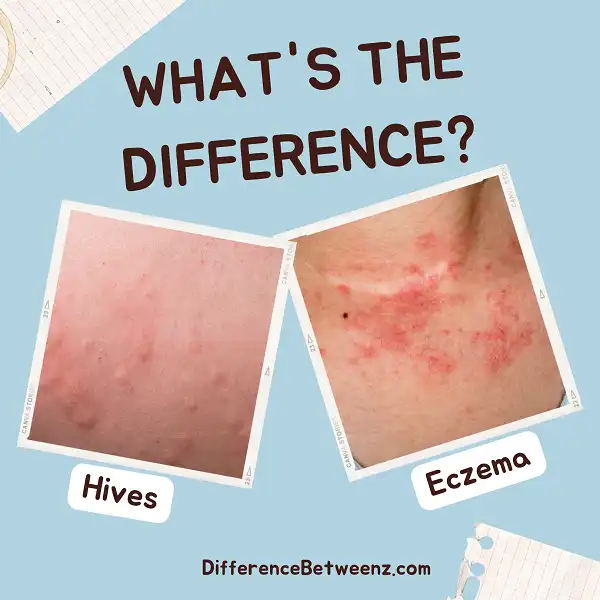Eczema and hives are both skin conditions that can cause a great deal of discomfort. While they may look similar, there are some key differences between the two. In this blog post, we will take a closer look at the difference between eczema and hives, including their causes and treatment options. We hope you find this information helpful!
What are Hives?
Hives are raised, itchy welts that can appear on any part of the body. They are often a result of an allergic reaction, but can also be triggered by stress or infection. Hives can vary in size and shape and can appear and disappear quickly. Some people only experience a few hives, while others may have hundreds.
Hives are usually not painful but can be very itchy. Treatment for hives typically involves avoiding the trigger and taking antihistamines to reduce itching and swelling. In some cases, corticosteroids may also be prescribed.
Hives typically go away on their own, but if they last longer than six weeks or are accompanied by other symptoms, it is important to see a doctor. Hives can be a nuisance, but they are usually not serious. With proper treatment, they will usually go away within a few days.
What is Eczema?
Eczema is a chronic condition that causes the skin to become itchy, red, and dry. It is most commonly found on the face, hands, and feet, but can occur anywhere on the body. Eczema is not contagious, but it can be uncomfortable and embarrassing. There is no cure for eczema, but there are many treatments available that can help to control the symptoms. In severe cases, oral or topical steroids may be necessary. With proper treatment, most people with eczema can manage their condition and enjoy a good quality of life.
Difference between Hives and Eczema
Hives and eczema are both skin conditions that can cause redness, itchiness, and swelling. However, there are some key differences between the two conditions.
- Hives are typically caused by an allergic reaction, while eczema is often the result of an underlying medical condition such as allergies, asthma, or stress.
- Hives tend to appear as raised, red welts on the skin, while eczema often results in a dry, scaly rash.
- Hives can be treated with antihistamines, while eczema requires a more customized treatment plan that may include topical corticosteroids and moisturizers.
While both hives and eczema can be uncomfortable, it is important to consult with a doctor to determine the best course of treatment.
Conclusion
Although both hives and eczema are skin conditions, they are caused by different things and are treated in different ways. If you’re not sure which condition you have, or if it’s something else entirely, make an appointment with your doctor for a diagnosis. In the meantime, here is some information about the two most common skin conditions in the United States.


